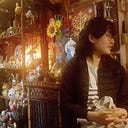Behind my comfort
I enjoy watching TV series. To me, they are like a microcosm of different cultures that I get to experience in my bed. The recent TV series that caught my eyes is The Good Place. For those of you who haven’t watched it, the synopsis goes like this:
The series is set in an afterlife in which humans are sent to the ‘Good Place’ or the ‘Bad Place’ after death: all humans are assigned a numerical score based on the morality of their conduct in life. Only those with the very highest scores are sent to the Good Place, where they enjoy eternal happiness with their every wish granted, guided by an artificial intelligence named Janet; all else experience an eternity of torture in the Bad Place. (Source: Wikipedia)
At the core of the series is one of the fundamental questions in life — what is it to be a good person?
I loved everything about The Good Place — the argument, synopsis, characters, acting, visuals (even the font), type of humor, and messages. Before jumping into favorite quotes from the series, I would like to detach myself from the series today and delve into some of the questions that I had with the series.
1. Why The Good Place, not The Heaven?
Technically, the concept of the ‘Good Place’ and ‘Heaven’ are very much alike. It comes with its counterpart, the Bad Place — just like Hell. Then, why did they not name the series Heaven but The Good Place?
My interpretation is that the choice of The Good Place as a title, instead of Heaven, provides an inclusive space for the various audiences to discuss what it is to be a good person and to imagine afterlife. Personally, I tend to associate Heaven or Hell with certain religions. As a non-religious person, it would have created a subtle barrier for me to engage in the series if it were named ‘Heaven’.
That does not mean I am indifferent to the idea of imagining what my afterlife would be (if there is one) or questioning what it means to be a good person. In fact, I do love and enjoy discussing these questions. I just do not know theological understanding of Heaven nor am I strongly affiliated with such an approach. Hence, for someone like me, The Good Place showed me a way to engage in the topic of the afterlife within the realm of my comfort zone.
2. Isn’t Buddhism religion?
Then, it hit me in the very last episode of the whole series that I realized “I had been too comfortable with its narrative.” The thought occurred to me where Chidi decides to end his time in the Good Place and spends his last day with his soulmate Eleanor.
Watching the very last sunset together on the sofa, Chidi and Eleanor talk about death. In an attempt to console Eleanor, whom he is leaving behind in the Good Place, Chidi quotes an analogy of wave from Buddhism to illustrate how death can be seen differently than loss. He begins with the following line:
For spiritual stuff, you gotta turn to the East.
Although the rest of his analogy clearly made sense to me, I can’t help but question his remark. Since when is Buddhism considered as spiritual stuff, not a religion?
As far as I know, Buddhism as a religion has various traditions. For instance, the one which my grandmother in South Korea believes, in fact, teaches an ethical framework of ‘you will go to hell if you do A, B, and C.’ (One of them was to have food waste. My grandma used to tell me ‘do not waste and finish your food. Otherwise, you’ll end up eating all of the leftovers in hell’ Somehow, I always thought Hell is a smelly place full of food waste.)
Furthermore, Eastern philosophy has evolved around worldly matters such as rules and regulations. To name a few, Confusions, Mencius, and Sunzi, all discuss not only how to live a good life but also how to govern a society, which can be seen far from spiritual. I do not know what Chidi mean by spirituality. Maybe he is right. But maybe not. It depends on what kind of Eastern philosophy is concerned.
As much as I loved the series, I was too comfortable with the narrative of The Good Place. I loved it because it well manages to steer clear of religion from the whole story. The series attempts to answer the question strictly from moral philosophical perspectives, not that of religions. As a result, even though many religious leaders have asked and addressed the same fundamental questions as moral philosophers, it does not take religious leaders into consideration. At best, Buddhism is considered as spiritual stuff.
I wonder, by trying too hard, am I dismissing religion (or religious texts) as a whole, which might have provided me with a great source of knowledge to explore the virtues and fundamental questions in life? I wonder… does that make me a firm believer in secularism?
